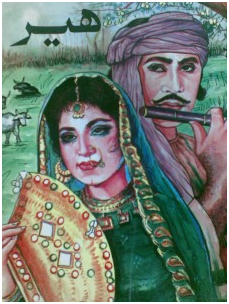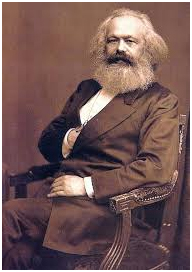|
Heer Forever Stands Tall
(ਗੁੱਝੀ ਰਹੇ ਨਾ ਹੀਰ ਹਜ਼ਾਰ ਵਿਚੋਂ ): A Post on Punjab
Pashaura Singh Dhillon
“Heer forever stands Tall” is something I, and I’m sure many Punjabis take for granted. That Waris Shah’s tragic love story, “Heer” would be counted amongst the most poignant love stories of the world.
But this is not so. Not according to the many lists my son, Navdeep Singh Dhillon, who teaches English literature at the School of Visual Arts in New York City, sent me.
A few weeks ago, I was preparing a radio talk on folklore literature for the Punjab News and Views Program Radio Talk Show, presented on KBIF900AM, in Fresno California. It is a discussion program in Punjabi for our central valley family of Punjabi listeners, which I co-host each Sunday between 3.00- 4.00PM. I asked Navdeep if there was a list of famous love stories in literature and folklore revered worldwide. He immediately sent me several lists. And surprisingly, while some of them mentioned some Indian love stories, none of them even mentioned Heer-Ranjha, or any other Punjabi love story. But William Shakespeare’s Romeo and Juliet was at the top of most of these lists.
Not only because I am a Punjabi and a romantic at heart, but based on merits, I had always thought that ‘Heer and Ranjha’ would be amongst the most famous, if not the most famous lovers, who ever roamed this earth..

William Shakespeare
I am a great admirer of William Shakespeare, and have read many of his plays in college, and sometimes even now. My son is also a very big admirer of his. Shakespeare wrote many famous plays during his lifetime, but what is truly remarkable is that even today, hundreds of years later, many of his plays are still the most read around the world. But churning out huge numbers of plays does not necessarily make his love stories better than someone like Waris Shah, who did not write hundreds of love stories. He only wrote one story in the form of an epic poem, affectionately known as ‘Heer Waris,’ into which he poured his heart and soul.
It is a profound meditation on the idea of love and elicits such an emotional response from all who read it, that the ‘Warsees’ refer to it as their Granth (Holy book). Warsees are a sect, who live at Waris Shah’s ‘Dargah’ (Buriel tomb) in what is now Pakistan (but will always be Punjab). They continue to carry on his legacy and give Waris Shah and his poetry the ultimate respect by worshiping the man and his profound words the same way many worship God. Warsees worship the wisdom of Waris Shah and his words in the same manner that people go to churches, mandirs, mosques, gompas, temples, and gurdwaras. Holy Books of the world’s religions: the Torah for the Jews, the Bible for the Christians, the Bhagavad Gita for Hindus, the Quran for Muslims, and the Guru Granth Sahib, for the Sikhs, are deemed to hold the truth in the form of Supreme wisdom with all the answers for every human condition and aspiration in the same manner that the Warsees believe. If people like Karl Marx are said to have drawn lessons from some of Shakespeare’s characters in their struggle for justice, Heer Waris has all the trials and tribulations they believe, which a society (human life) has to endure. It is perhaps waiting for a social reformer or philosopher like Karl Marx to visit it.

Heer Ranjha by Waris Shah
This story of Heer-Ranjha was true then as it is now, and no wonder there have been so many attempts to write, rewrite, publish, republish since the 18th century when in 1766, Waris Shah is said to have completed its first hand written version. According to some estimates, there are 150-200 editions. Makbool and Damodar are considered to be amongst the firsts, who wrote Heer almost two centuries ago, while Suba Singh and Gian Singh I.A.S, are believed to have written the latest versions in recent times. Undoubtedly ‘Heer Waris’ amongst all is the most read (if not fully understood), piece of literature by the people of Punjab, which once was stretched all the way from Delhi to Afghanistan. According to UNESCO based on numbers, Punjabi is the 11th largest language spoken worldwide.
Authors besides, talking of the main characters, Romeo and Juliet topping the lists, is also a love story which is very tragic indeed. Simply stated, it is a tale of two teenagers from two feuding families, who fall in love at first sight and remain true to their love, despite the conniving attempts by people close to them to thwart their love. Against everyone’s wishes, they seal their love by getting married, and eventually die in each other’s arms, thereby becoming true lovers free from societal norms, and are free to be with one another. Barring Shakespearian great skills as a writer, the criterion used here appears to be, to take one’s own life for ones lover alone, is a sign of true love. And for doing this, the couple Romeo and Juliet has become a synonym for love itself. The only good outcome was perhaps that their “untimely deaths” ultimately unite their feuding households.
In Waris Shah’s Heer and Ranjha on the other hand, the idea of tragic love is taken to a much more painful level: reality. The reality of Heer and Ranjha’s tragic love story is not that either of them die a physical death, but that they continue living and have died a metaphoric death by succumbing to the world they live in, rather than leaving it alltogether. Both of them keep on pursuing each other for more than a decade. Swallowing his family pride, and to be close to his true love Heer, Ranjha keeps obeying all the whims and commands, doing all chores, including tending cattle herds for Heer’s father for all these years, without bearing any grudges against anybody including Heer’s evil uncle Kaido Langa’n. Kaido plays all mean and dangerous tricks as a villain, to ensnare Ranjha and keep them apart. Finally, when Heer gets married off against her will by the Qazi she thought was a man of God, Heer does not beg of him for sympathy. Heer dares to challenge Qazi’s judgment and rebels. But she is forcibly given away in a palanquin (doli). But the story doesn’t end there. In order to achieve at any cost, what was most pious and precious for him, his love Heer, Ranjha undertakes the most difficult task of undergoing a transformation to become a ‘Fakir,’ the ultimate in discipline and personal sacrifice for any ordinary human being.
Notwithstanding conspiracies and feuding family honors, Heer and Ranjha without lifting a finger at anyone, did not die for each other. They chose instead, to bravely live for each other longer than any other true lovers I have read about against all odds and under all circumstances. Unlike most of the folk love stories of yesteryears, especially of Shakespeare, theirs’ is not a love story of Kings and Queens or characters larger than life, who had the luxury of being who they were in the first place. The love story of Heer–Ranjha, is a true mirror reflecting the essence of everyday life and culture of the people, who once inhabited Jhang Sial and Takhat Hazara in Punjab.
I had thought that Waris Shah’s Epic Poetry Book ‘Heer’ which is so encompassing, so gripping and so poetically striving at the root cause of human misery, trials and tribulations, defeats and triumphs, will be amongst one of the top most, if not the top most love stories in the World’s History and Literature.

Karl Marx, a philosopher and social reformer
In my younger days I thought of Karl Marx’s views as being logical based on economic wellbeing alone, which my younger self agreed that this forms the basis of life. Now in my sunset days as I dig deeper, I find that Sigmund Freud’s views that love, and not economics, is the driving force, was not that far off either. My take on this subject now is that Marx and Freuds’ views could both, not only be right, but indispensible. Both views, instead of contradicting, complement and supplement each other like balanced wheels. As they say “food and romance go hand in hand.” Mankind could not have survived and reached thus far only on one wheel.
In the Land of Five Rivers (Punjab) also known as the cradle of civilization, their love tragedy made the worldly love immortal. Undoubtedly this is the most read and most popular piece of literature with the people of Punjab. According to Professor Mohan Singh, there is hardly any Punjabi who did not read the story, or had not heard about Heer-Ranjha. I just hope this trend continues to future generations. What is particularly interesting, even unfortunate is that unlike many of the “classics,” in both the Eastern and the Western traditions, there has never been a movement to get “Heer” into classrooms, or onto bookshelves with reprints or any incentives from publishers. Nevertheless, it has just been kind of ingrained in the mindset of a Punjabi so much so that many verses from Heer have become proverbial words of wisdom for ordinary Punjabis who use those lines in their daily life. This gives me hope that this legacy is intact for the generations to come.
Since I am making a case for Waris Shah, the master Poet of all times in Punjabi language, I took upon me the challenge jointly posed by my son Navdeep, and a scholar and a gentleman Gurbachan Singh Bhullar, to record Heer in my voice and post it on ‘You Tube.’ As Waris Shah wrote:
” ਯਾਰਾਂ ਅਸਾਂ ਨੂੰ ਆਣ ਸਵਾਲ ਕੀਤਾ, ਇਸ਼ਕ਼ ਹੀਰ ਦਾ ਨਵਾਂ ਬਣਾਈਏ ਜੀ
ਰਾਂਝੇ ਹੀਰ ਦੇ ਇਸ਼ਕ਼ ਦੀ ਗੱਲ ਸੁੱਤੀ, ਨਵੇਂ ਸਿਰੇ ਤੋਂ ਫੇਰ ਜਗਾਈਏ ਜੀ ” |
Yaran asan nu aan sval keeta, ishq Heer da nvan bnaieye ji,
Ranjhe Heer de ishq di gl suti, nven sirey ton pher jgaieye ji
A series of audio recordings in my voice singing selected passages from Waris’s Heer, how it all began, will follow in my next blogs and You Tube. Punjabi lovers meanwhile, sit back, enjoy and ponder:
Do you believe in true love? Do you believe in love at first sight? Do you believe in love lasting forever? I think that these love stories renew or reinforce our faith in love. In my view Heer-Ranjha deserves to be one of the most famous love stories in history and literature of the world; it is immortal. What do you think ?
Curtsey:www.pashaurasinghdhillon.com
Link: http://www.pashaurasinghdhillon.com/discussion/heer-forever-stands-tall/
|